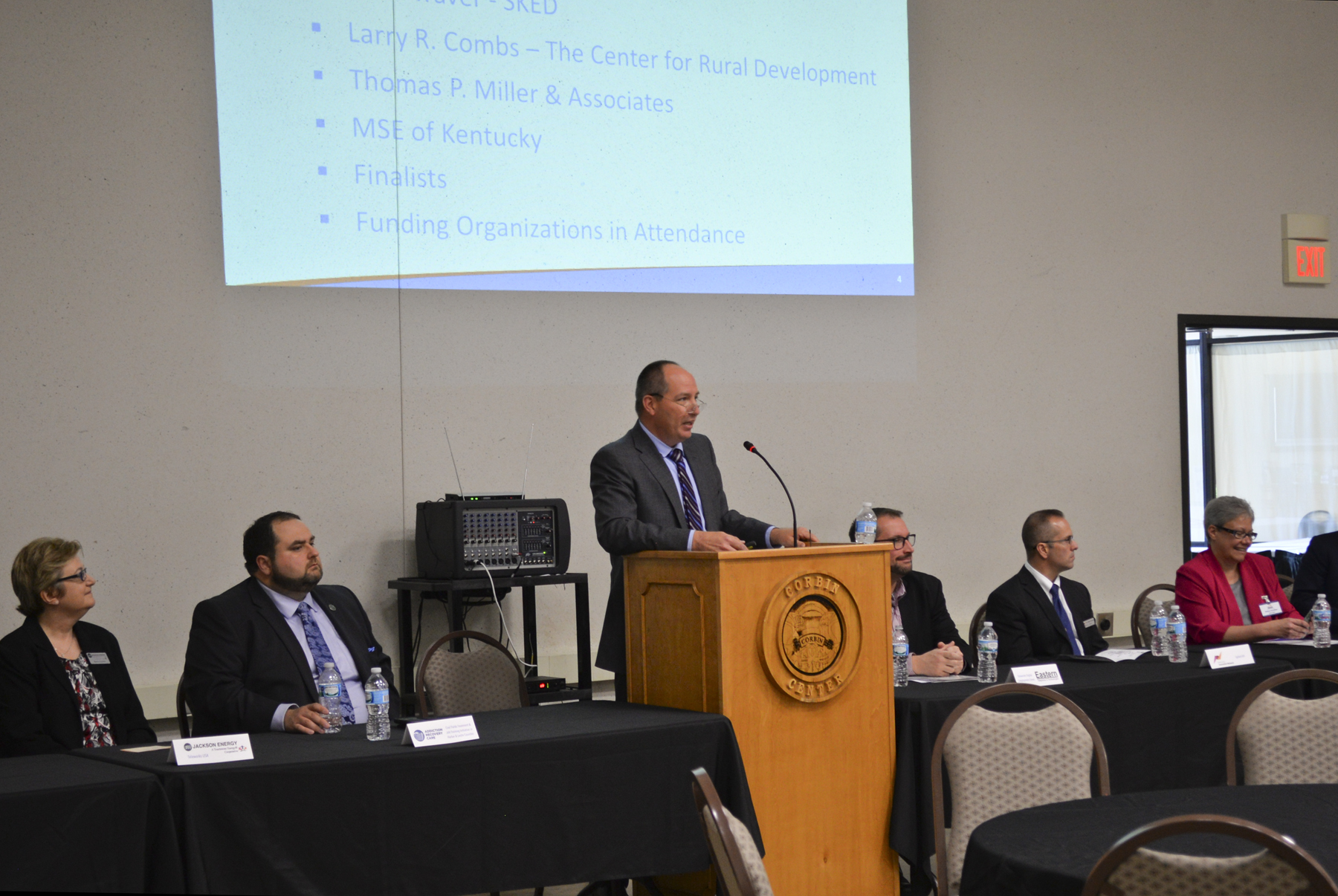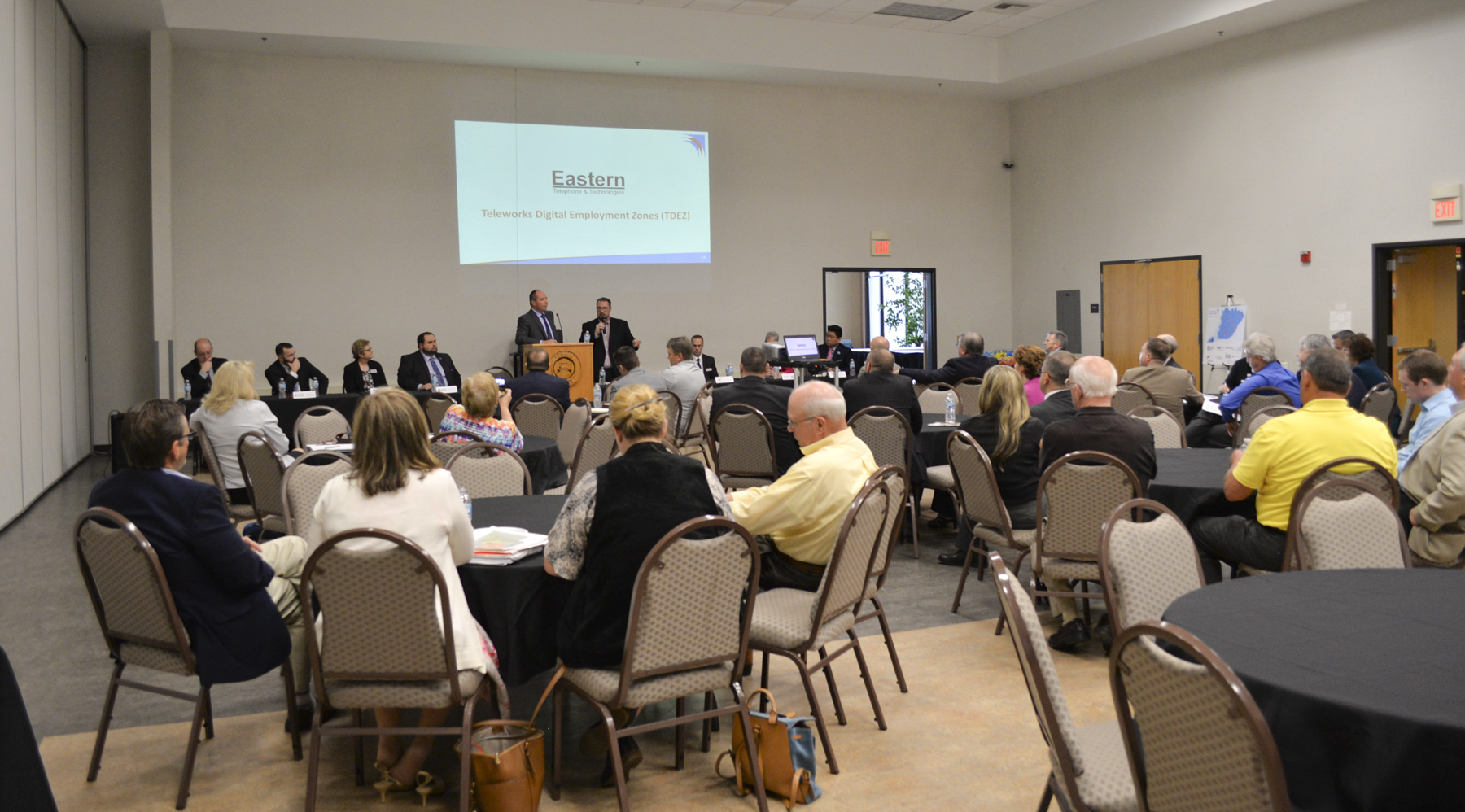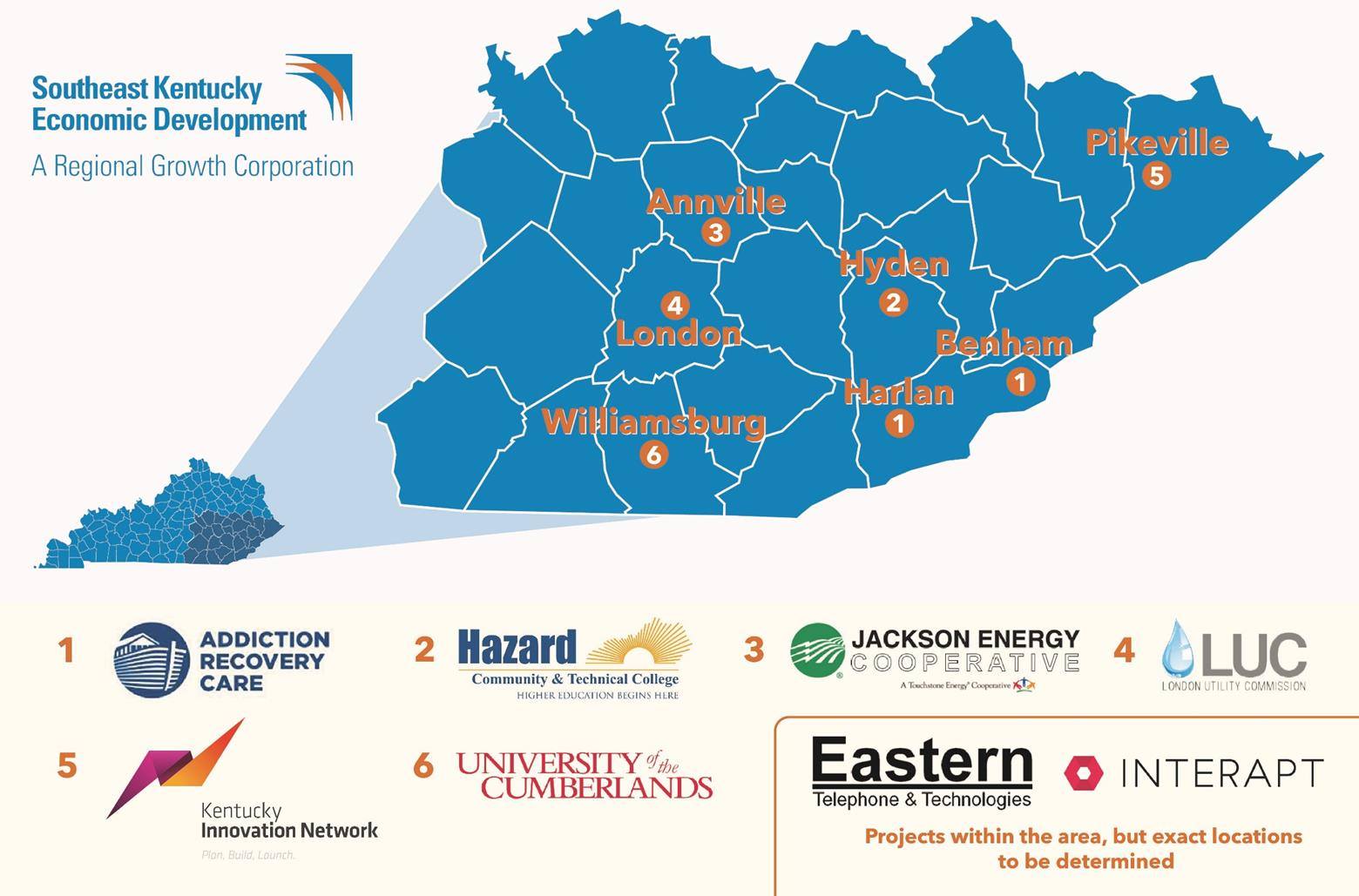
Brett Traver, executive director of Southeast Kentucky Economic Development Corporation (SKED), introduces the eight finalists in the Moving Eastern Kentucky Forward with Broadband initiative.
Moving Eastern Kentucky Forward with Broadband initiative
The promise of accessible, high-speed broadband is motivating communities in Eastern Kentucky to come up with creative, innovative projects that will move Kentucky forward and create training and employment opportunities in a 21st Century digital economy.
Eight finalists in the Moving Eastern Kentucky Forward with Broadband initiative pitched ideas for short- and long-term economic development projects that would leverage the state’s broadband initiative, KentuckyWired, to a panel of potential regional, state, and national funding agencies.
Southeast Kentucky Economic Development Corporation (SKED) introduced the finalists and brought project leaders together for the first time at a regional meeting in April at The Corbin Center. Finalists presented their projects and talked about how they intend to implement their plans in the region.
SKED, a regional nonprofit economic development corporation and affiliate of The Center for Rural Development, received a $100,000 grant from the U.S. Department of Commerce’s Economic Development Administration (EDA) in 2016 to conduct a feasibility study to identify short- and long-term economic development projects leveraging broadband infrastructure.
In partnership with Thomas P. Miller & Associates, MSE of Kentucky, and representatives from The Center, SKED worked to identify projects in 26 coal-impacted Kentucky counties that may be eligible for approximately $500,000 to $2 million in funding from various sources.
The eight finalists, selected from a field of 15 solicited proposals, are:
- London Utility Commission: The U.S. 25 & Fariston Industrial Park Broadband Expansion, in partnership with the London-Laurel County Industrial Development Authority, proposes to transform the newly developed Fariston Industrial Park into a “Gigabyte Broadband Technology Park.” The project includes incremental upgrade of nine miles of KentuckyWired fiber and the extension of approximately five miles of 144-strand “last mile” fiber from the endpoint of the proposed KentuckyWired middle mile network to the Fariston Industrial Park in Laurel County.
- Hazard Community and Technical College: The Hazard Community and Technical College is proposing a Medical Assisting/Telemedicine program. The project will train students on cutting-edge equipment that will enable them to earn a degree in medical assisting and/or certificates in electrocardiograph, telemedicine technician, and certified nurse aide.
- Jackson Energy Cooperative: The regional utility has developed a program to give residents in its service area the skills they need to work from their homes as customer service agents for regional and national companies. Teleworks USA is projected to create 300 new jobs for a projected cost of $480,000, in partnership with Eastern Kentucky Concentrated Employment Program, People’s Rural Telephone Cooperative, and city and county leaders in all three counties.
- Addiction Recovery Care LLC: The Coalfields Treatment & Job Training initiative is designed to create substance abuse treatment and job training campuses in two abandoned schools in Harlan and Leslie counties.
- Interapt: The Technology Ecosystem of Kentucky (TEKY) Satellite Office, a partnership with the Eastern Kentucky Concentrated Employment Program, the Appalachian Regional Commission, and regional industries, plans to develop a larger Technology Ecosystem of Kentucky. The project includes a training and tech center to support technology infrastructure in one of the coal-impacted counties in Eastern Kentucky.
- Kentucky Innovation Network: UpTech is a partnership between the University of Pikeville’s Coleman College of Business, the Kentucky Innovation Network Pikeville office, and the city of Pikeville Office of Economic Development developed to create an accelerator for data-driven startups. Project plans include bringing companies to Pikeville to educate them and prepare them to open their businesses and create jobs in Eastern Kentucky. The accelerator is projected to attract tech-based companies using broadband.
- University of the Cumberlands: The Appalachian Institute for Information Sciences and Workforce Development includes new internship opportunities, a certified testing center, and virtual simulations for augmented reality (AR) experiences. Training will prepare high school students, displaced workers (including coal miners), and others for jobs in the technology sector.
- Eastern Telephone & Technologies: The Teleworks Digital Employment Zones (TDEZ) is a collaboration between Eastern Kentucky Concentrated Employment Program’s Teleworks USA and the Kentucky Highlands Promise Zone. Eastern Telephone & Technologies plans to identify broadband and employment-challenged areas where affordable broadband will create work-from-home opportunities. Upon designation, fiber-fed broadband systems will be deployed in 11 or more small communities. Teleworks USA will promote, train, and place jobseekers in digital work-from-home jobs.

Harlan County Judge-Executive Dan Mosley asks the panel a question about the Moving Eastern Kentucky Forward with Broadband project at a regional meeting in Corbin.
“These projects represent some of the most creative and innovative ideas we have in the region to take advantage of opportunities presented by KentuckyWired,” Larry Combs, manager of broadband implementation for The Center for Rural Development, said. “Accessibility to high speed, affordable broadband will level the playing field and give communities more resources than ever before to create new training and employment opportunities in the region.”
The KentuckyWired Middle Mile plan was contracted by the Commonwealth of Kentucky to bring over 3,000 miles of high-speed, high-capacity fiber infrastructure, often referred to as the “middle mile,” to 120 Kentucky counties.
Projects in the Moving Eastern Kentucky Forward with Broadband initiative are required to leverage KentuckyWired I-Way and other broadband networks in the eligible counties.
SKED and its partners prioritized the selected project finalists, sought resources, funding, and partnerships to see that the projects are realized, with the hope they would ultimately produce new jobs and investments for the region.

Eight finalists in the Moving Eastern Kentucky Forward with Broadband initiative pitched their ideas for short- and long-term economic development projects to a panel of potential regional, state, and national funding agencies and the general public.
Representatives from the federal Economic Development Administration, U.S. Department of Agriculture, U.S. Congressman Harold “Hal” Rogers’ office, and the Kentucky Department for Local Government were available for the project presentations and invited to meet privately one-on-one with project leaders to discuss their funding needs.
“We’re very pleased with the projects,” said Brett Traver, executive director of SKED. “All the participants and partners put a lot of thought and effort into the process. Hopefully, this is the first step in making some of these happen in the region to create more and better job opportunities.”
For information about SKED and Moving Eastern Kentucky Forward with Broadband, visit www.southeastkentucky.com.
To learn more about KentuckyWired broadband project, visit www.kentuckywired.ky.gov or call The Center for Rural Development at 606-677-6000.





